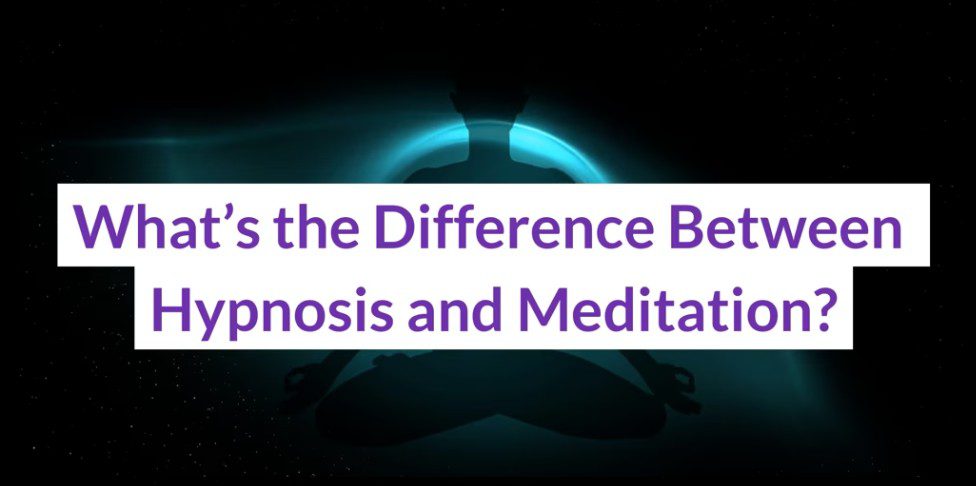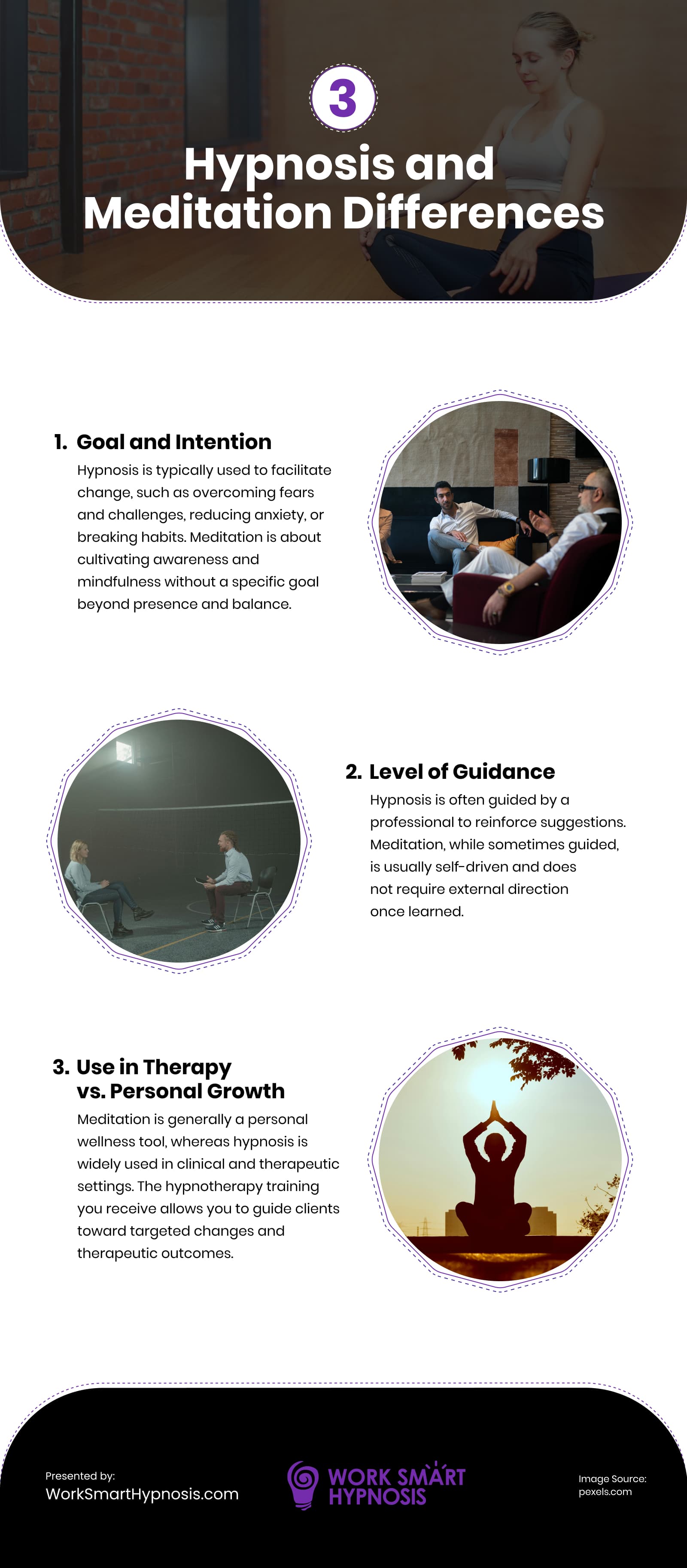Hypnosis and meditation are often spoken about in the same breath, as both involve altered states of consciousness, deep relaxation, and heightened focus. However, while these two practices share similarities, they serve distinct purposes and affect the mind differently.
In your career as a professional hypnotist, you must understand the difference between these practices. Recognizing how each practice uniquely influences the mind allows you, as a practitioner, to explain the differences to prospective hypnosis clients and help them understand how each practice can serve them.
What is Hypnosis?
Hypnosis is a state of focused attention and heightened suggestibility, enabling direct access to the subconscious mind. Unlike meditation, which often involves passively observing thoughts, hypnosis actively guides the subconscious toward specific changes, whether in behavior, emotions, or habits.
Hypnosis facilitates deep relaxation and increased receptivity. This state makes it easier to bypass the analytical conscious mind, allowing positive suggestions to take root more effectively.
How Hypnosis Works
A typical hypnosis session follows a structured approach:
- Induction Phase – You guide your client into a relaxed state through breathing techniques, visualization, or progressive relaxation.
- Deepening Phase – The trance state deepens, enhancing receptivity to suggestions.
- Suggestion Phase – You use hypnotherapy techniques to introduce affirmations or imagery tailored to your client’s goals.
- Emerging Phase – You gradually bring your client out of hypnosis, feeling refreshed and empowered.
Because hypnosis is often used for therapeutic purposes, it is widely applied in behavioral therapy, habit reversal, pain management, and emotional healing. During your hypnotherapy training courses, you learn how to facilitate this process, helping clients reprogram negative thought patterns and achieve transformation.
What is Meditation?
Meditation is a self-guided mental practice that can enhance mindfulness, emotional balance, and self-awareness. Unlike hypnosis, which often involves direct suggestions, meditation encourages individuals to observe thoughts without attachment or judgment.
There are various forms of meditation, each with different approaches. Mindfulness Meditation encourages present-moment awareness and non-reactivity to thoughts. Transcendental Meditation (TM) involves silently repeating a mantra to reach a relaxed state. Loving-Kindness Meditation cultivates compassion and positive emotions toward oneself and others. Guided Visualization uses imagery to create relaxation or specific mental states.
Meditation does not aim to change thoughts but to develop a calm and observant mind. This contrasts with hypnosis, where subconscious patterns are actively reshaped through guided suggestion.
Key Differences Between Hypnosis and Meditation
While hypnosis and meditation share deep relaxation and altered consciousness, they differ in several key ways:
- Goal and Intention
- Level of Guidance
- Use in Therapy vs. Personal Growth
Hypnosis is typically used to facilitate change, such as overcoming fears and challenges, reducing anxiety, or breaking habits. Meditation is about cultivating awareness and mindfulness without a specific goal beyond presence and balance.
Hypnosis is often guided by a professional to reinforce suggestions. Meditation, while sometimes guided, is usually self-driven and does not require external direction once learned.
Meditation is generally a personal wellness tool, whereas hypnosis is widely used in clinical and therapeutic settings. The hypnotherapy training you receive allows you to guide clients toward targeted changes and therapeutic outcomes.
Can Meditation and Hypnosis Work Together?
Despite their differences, hypnosis and meditation can complement each other when used strategically. Some key overlaps include:
- Meditation can enhance hypnosis receptivity – Regular mindfulness practice improves focus, making it easier to enter a hypnotic state.
- Hypnosis can deepen meditation experiences – Hypnotic techniques can guide individuals into deeper meditative states.
- Both promote emotional resilience – While hypnosis fosters structured change, meditation provides an ongoing tool for self-regulation and stress management.
Many practitioners of advanced hypnotherapy training integrate meditation techniques to help clients sustain long-term emotional well-being.
Which One is Right for Your Prospective Client’s Goals?
Meditation is an excellent practice for a prospective client hoping to cultivate mindfulness, reduce stress, and enhance awareness. However, if they seek to overcome habits, address emotional blocks, or create profound subconscious change, hypnosis offers a more targeted approach.
You might suggest some clients pursue mediation in addition to your professional hypnosis sessions. If you feel they would benefit from the increased mindfulness and stress reduction meditation can offer, in addition to the change-focused work of hypnosis, you can discuss how they can add meditation to their wellness routines.
Mastering the distinctions between hypnosis and meditation allows you to apply these tools more effectively and guide your clients to the most appropriate solutions. You may even consider adding guided meditation services to your hypnosis business so that you can help your clients see the benefits of both practices.





